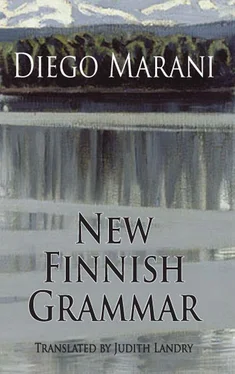The room was sunk in glowing semi-darkness. Koskela lit a candle, and his face appeared, etched out of the darkness by its light. His gestures cast a shadow on the wall, serving as background to his story. In those shadows I could see Untamo raising his knife, Kalervo’s village going up in flames — scenes from another world, summoned up and sent dancing mysteriously upon the wall in front of me by Koskela’s words, which put me in mind of some formula uttered during a spiritualist seance.
‘When Untamo saw the bestiality that blinded that child’s gaze, he was stricken with fear: he realized that that little creature would be the instrument of his own death. He ordered that he be put in a barrel and cast out to sea. But after three days and three nights the barrel was washed up on the shore, and Kullervo was found to be unscathed: the hatred burning within him had saved his life. Then Untamo ordered that a great pile of wood should be made, and that the child should be tied up in its midst; but when, after three days, the flames died down, Kullervo was still alive, up to his knees in ashes, and his eyes burned like the fire which was to have been his undoing. Then Untamo drove him from the village, hoping to exorcize the threat he posed. Kullervo was purchased by the smith Ilmarinen, who tried to make a good servant of him. But Kullervo was a beast, born to hate and destroy. He slaughtered the smith’s wife, the beautiful virgin of Pohjola, and fled into the forests of the North, banished from the society of men for the atrocities he had committed. The old woman he met by the side of the black river separating the land of Kaleva from Tuonela, the kingdom of the dead, was certainly a demon. It was she who told him that his father, his mother and his sister were still alive, on the shore of the lake which bordered Lapland. “My hapless son, are you still wandering this world with your eyes open?” These were the words with which his mother greeted him. But not even family affection could deflect Kullervo from his brutish mission. In vain did his father attempt to teach him to make himself useful. He sent him off to fish; but Kullervo’s hands were too powerful to simply hold the oars, they had been trained to crush, to wreck. He broke the rowlocks, shattered the keel. Then his father told him to pull on the nets and beat the water, so as to catch some fish. But Kullervo made mincemeat of the fish and reduced the oars to pulp.
In desperation, his father then told him to take a sledge and go off to pay the taxes.
‘Perhaps your strength will serve you on the journey,’ his father sighed. It was on Kullervo’s return, as he was roaring through Pohjola’s lands, knocking down trees and flattening the hillsides, that he met his sister and, failing to recognize her, raped her. When, returning home, he realized what he had done, Kullervo gave up all hope. “May I find death in the jaws of the howling wolf or the roaring bear, or in the belly of the barracuda!” he yelled amidst his tears, on his knees before his mother.
“No, my son, that will not help you, nor will time bring you solace or forgiveness until the whole of your allotted destiny has been played out,” answered his mother, crushed by grief. For she knew that only when he had massacred the whole house of Untamo would her son be free of the hatred that she herself had planted in his heart. Now he had turned into a giant, twisted tree, one which no axe could dint.’
As he spoke, Koskela had become in turn a wolf, a bear, a barracuda. Now he was a tree, motionless in the middle of the room: his skin had become bark, his outstretched arms gnarled branches, waiting expectantly. He was breathing heavily: like the real trees outside, he rustled in the night wind.
‘The day he left to wage war against Untamo, Kullervo did not know that he would never see his mother again, that with the conclusion of his mission his life too would end; that the pain which had driven him to it would be put out. His mother, like all mothers, sensed as much; but she could not hold him back. She had dreamed that he would have a happy life, that she would enjoy a calm old age beside him. Fate had decreed otherwise, and that fate was now being inexorably played out. In vain she begged her son to stay; she would rather have him alive and accursed than dead and liberated. But Kullervo was deaf to her entreaties, and proceeded to massacre all of Untamo’s kith and kin, leaving their village a smoking wreck. When he returned home and found only the dog, Musti, he saw that this was the end. It was remorse that killed him; nothing else could have.’
Here Koskela broke off again, poured out another two glasses of koskenkorva and again downed his own in a single gulp. That night’s story included many words I did not know, mention of many objects I had never heard of; but I didn’t feel that I could interrupt him and ask for explanations. Even when I lost the thread, I was captivated just hearing him speak. In the darkness, I could no longer read his lips. His eyes were two craters in his lunar face, his mouth a black abyss, a volcano that spat out sounds; it was those I now followed, rather than the words. Above all, I liked the names: Antero, Kullervo, Untamo, Kalervo. They were not merely names, they were magic formulae. It was as though, by pronouncing them, their owners would emerge alive from the pastor’s throat, like so many monsters which he had been harbouring deep in his entrails, and wander around the room, bemoaning their fate and dancing around as though possessed.
‘The fight against the evil which drove Kullervo to commit his crimes goes on to this day. Väinämöinen was right: we can do nothing against it. Human life bursts into flames, then burns and dies out without a jot of all the pain we bear within us being consumed. Quite the reverse: this insatiable animal feeds upon every man who comes into this world, upon every life which is added to the lives already here. It grows and grows, devouring everything around it, like those loathsome fish which live in the muddy depths of lakes where no algae grow. All we can do is to deny it its nourishment. If the world’s evil feeds upon our lives, only without them will it grow hungry, and so die. That is why the killing must go on, why every war is good; why every death takes us nearer our goal!’
Now there was anger in the pastor’s eyes. His irate shadow lashed the room, and I felt I had to get up from where I was sitting to protect myself. I flattened myself against the wall, that same wall that Koskela used to stare at during his hallucinations. I sounded out its cracks and lumps, my hands behind my back. I had the impression that they were mysterious signs, key to some rite of passage, and that that wall was the doorway to another world. In the guttering light of the candle I saw the figure of Kullervo in the Kalevala that lay open on the table, the painting by Gallen-Kallela that Koskela had showed me on several occasions. His eyes raised to the skies, his face distorted in a furious grimace, his fist firmly clenched, his whole appearance made me shudder. The red light falling in through the window was now becoming slowly tinged with grey. The sun was sinking behind the forests and a dense layer of salt-laden cloud was settling over the sleepless city. The pastor was waving his fist in front of the square of transparent window, but it no longer cast any shadow.
‘What is the message of the cross, if not death? Powerless in the face of evil, God has at least tried to show us the way out!’
That night I dreamed that waves of soldiers were emerging silently from the sea and falling upon the city; they had black lumps instead of eyes. All that was to be seen of their faces was their mouths, twisted with effort. They were running through the streets of the town centre at breakneck speed, their steps echoing on the cobbles like the roll of a broken drum, swarming all over the place like so many black insects. They came pouring into the Suurtori, climbed the steps up to the cathedral and went down the other side. They were running but not stopping, never firing, they had no weapons. They went through the city, making their way through the terrified crowd, then vanished into the woods, dived into the lakes, never to re-emerge. Then suddenly we realized that it was they who were frightened of us, it was they who were fleeing. Then we ran after them, hoping to grab hold of them, but there were too many of them, they slipped through our grasp like shadows, like clouds in the sky, like mice. Then they were no more to be seen, and all that could be heard was our shouts as we ran after them.
Читать дальше












